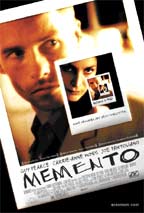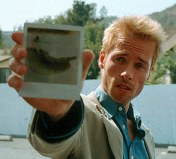| Memento |
| |
 |
USA, 2000. Rated R. 113 minutes.
Cast: Guy Pearce, Carrie-Anne Moss,
Joe Pantoliano, Mark Boone Junior, Stephen Tobolowsky, Harriet Sansom
Harris, Jorja Fox, Callum Keith Rennie, Larry Holden
Writers: Christopher Nolan (screenplay) & Jonathan Nolan (story)
Music: David Julyan
Cinematographer: Wally Pfister
Producers: Jennifer Todd, Suzanne Todd
Director: Christopher Nolan
LINKS
|
 he Greek
myth of Sisyphus is the story of a mortal who, after defying Death, was sentenced
by the gods to spend eternity in a futile endeavor: pushing a heavy boulder
up a mountain only to have it roll to the bottom each time he approaches the
pinnacle. In his short essay Le Myte de Sisyphe (1942), novelist and
existentialist philosopher Albert Camus enjoined us to imagine that Sisyphus
is happy. All life's endeavors are absurd, wrote Camus, and the struggle toward
the heights is itself "enough to fill a man's heart." Conscious of his tragic
fate, the existential man chooses it anyway. He embraces it.
he Greek
myth of Sisyphus is the story of a mortal who, after defying Death, was sentenced
by the gods to spend eternity in a futile endeavor: pushing a heavy boulder
up a mountain only to have it roll to the bottom each time he approaches the
pinnacle. In his short essay Le Myte de Sisyphe (1942), novelist and
existentialist philosopher Albert Camus enjoined us to imagine that Sisyphus
is happy. All life's endeavors are absurd, wrote Camus, and the struggle toward
the heights is itself "enough to fill a man's heart." Conscious of his tragic
fate, the existential man chooses it anyway. He embraces it.
But what if Sisyphus is not conscious of his fate? What if, every time he sets
about rolling the rock up the mountain again, his memory of the previous attempt
has already faded away? What if he has no memories at all? Does he know why
he's pushing the rock? Can he be sure that he's even pushing the right one,
or that he's on the right mountain? Where is the nobility in his endeavor now?
These are some of the questions posed in Memento, where Leonard Shelby
(L.A. Confidential's
Guy Pearce) is cast in the role of a brain-damaged Sisyphus. A head injury sustained
while intervening in the brutal rape of his subsequently deceased wife has left
him with no short-term recall. His memories from before the injury are intact,
but he is completely unable to form new ones. If he has a conversation, by the
end of it, he won't remember what was said at the beginning. He goes through
life feeling as if he has just awakened. But he has a rock to push--a goal that
keeps him going. He is hunting down his wife's killer to avenge her death.
How can such a man, who cannot be sure of anything, pursue this goal? Leonard
has his methods. He explains that organization and conditioning (forming habits)
can make up for the inability to remember anything. Leonard carries Polaroids
with notes in his pocket, and he tattoos vital information on his body. His
wife's killer's name is "John G.," for example, and he is a drug dealer. At
least, that's what Leonard's notes say.
Memento has one of the most unusual narrative structures you will ever
see. The story runs along two entwined tracks. The first track, filmed in black
and white, consists mostly of Leonard having a telephone conversation in his
hotel room with an unknown person, in which he explains his methods and talks
about his life before the accident.  Although
the first track runs through the whole movie, it occurs at the beginning of
the story, chronologically speaking. It delivers most of the exposition and
provides a running commentary on the second storyline, until they join together
at the end of the film.
Although
the first track runs through the whole movie, it occurs at the beginning of
the story, chronologically speaking. It delivers most of the exposition and
provides a running commentary on the second storyline, until they join together
at the end of the film.
The second track runs backward, from end to beginning. Memento begins
with its denouement, and each following narrative segment concludes with the
beginning of the previous segment. Thus Memento recreates what it's like
to be Leonard: at any given moment, we have no idea how or why we got where
we are. We have only the information Leonard has in his pockets or tattooed
on himself. Nevertheless, Leonard doggedly pursues his investigation, with unexpected
and sometimes amusing results.
AboutFilm.Com
The Big Picture
|
| Alison |
B+
|
| Carlo |
A-
|
| Dana |
B+
|
| Jeff |
A-
|
| Kris |
A-
|
| ratings explained |
During the course of his investigation, Leonard runs into Natalie (Carrie-Anne
Moss) and Teddy (Joe Pantoliano). Beyond the short notes he has written to himself
("She will help you out of pity," regarding Natalie, and, "Don't believe his
lies," regarding Teddy), Leonard has no idea who they are or why they are in
his life. They do seem to know him, though. It's appropriate that these two
are played by The Matrix vets Moss (projecting
melancholy iciness) and Pantoliano (projecting smarmy friendliness). They remind
us that not everything is as it seems, that reality is subjective, and that
there is no spoon. Unfortunately, the reminder is lost on Leonard, who probably
doesn't remember seeing The Matrix.
Unlike The Matrix, Memento doesn't offer clear-cut answers. It
is a film about subjectivity, and so the truth remains just beyond our reach.
At the end of the movie, we're still not sure of what is real and what is not,
and it seems as if there may be some logical flaws. When Memento comes
out on DVD, we will be able to program our players to play the movie in its
proper chronological order, and we'll be able to judge better how the story
holds together. But even after repeated viewings, we may find that making sense
of Memento is itself a Sisyphian task. Then again, Camus would probably
argue that arriving at definite answers is an absurd goal, and isn't the point
of a film like Memento. The point is merely to search for them. That's
where the pleasure in Memento lies.
Note: The official site for
this film contains a great deal of fascinating background information on Leonard
and his condition, presented as news items, document scraps, and Polaroids--information
that helps fit the pieces of the puzzle together. We recommend it highly to
people who have already seen the film, but it is not for people who haven't
(unless you just want to see the trailer and production notes).
Review
© April 2001 by AboutFilm.Com and the author.
Images © 2000 by New Market Films. All rights reserved.


 Although
the first track runs through the whole movie, it occurs at the beginning of
the story, chronologically speaking. It delivers most of the exposition and
provides a running commentary on the second storyline, until they join together
at the end of the film.
Although
the first track runs through the whole movie, it occurs at the beginning of
the story, chronologically speaking. It delivers most of the exposition and
provides a running commentary on the second storyline, until they join together
at the end of the film.
